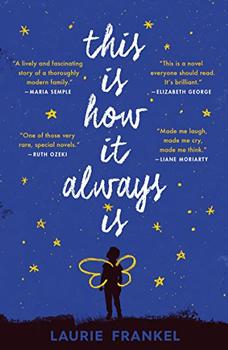Summary | Excerpt | Reading Guide | Reviews | Beyond the Book | Readalikes | Genres & Themes | Author Bio

Excerpt
This Is How It Always Is
Once Upon a Time, Claude Was Born
But first, Roo was born. Roosevelt Walsh-Adams. They had decided to hyphenate because—and in spite—of all the usual reasons but mostly so their firstborn could have his grandfather's name without sounding too presidential, which seemed to his parents like a lot of pressure for a six-pound, two-ounce, brand-new tiny human. First Roo was born, all pink and sticky and loud and miraculous. Then Ben was born. Then they debated and deliberated and decided just one more and therefore got twins—Rigel and Orion—who were no doubt going to voice hostility about their names when they became older than four, especially when Rigel found out he was named after the constellation's toe, but who for the moment were too little and too loud to care. The leap from two to four felt astronomical, so their parents had turned to the heavens.
All of which was why, despite being a woman of considerable science, a disciple of logic and reason, a person grounded firmly in the right half of her right mind, and besides all that a doctor who knew better, Rosie Walsh was spending the fifteen minutes immediately preceding the kickoff of Claude dragging her bed from its spot on the wall into the middle of the room so that it faced east-west rather than north-south. The Talmud, her mother reported, was very clear that many sons were born to a man whose bed was facing north, and though Rosie doubted it sincerely, along with most of what the Talmud offered, she couldn't take the chance. She'd also quietly served salmon to her husband for lunch and, though of course they were adults, chocolate-chip cookies, German folklore prescribing red meat and salty snacks for men in need of heirs and afternoon delight for those desirous of daughters. The same website also suggested putting a wooden spoon under the bed to conceive a girl, and she did, then felt like an idiot and threw it on the dresser then thought Penn would mock her—and rightly—if he saw it there so stashed it the only place close at hand: under the bed. Couldn't hurt.
The sources, dubious and dubiouser, also recommended missionary position, and she was happy to oblige. Missionary position was, as far as she could tell, like vanilla ice cream: purported to be boring and chosen only by passionless, unimaginative, exhausted people but really the best one. She liked to look at Penn's face so close that it split into pieces like a modernist painting. She liked the length of his front pressed against the length of hers. She felt that people who needed to do it upside down and backward from behind—or who added candied bacon or smoked sea salt or pieces of raw cookies to their ice cream—were probably compensating for a product that was inferior to begin with.
The dubious sources also recommended that the woman refrain from orgasm. But you could only take these things so far.
Once upon a time, Dr. Rosalind Walsh and her husband had had sex that started spontaneously and uncontrollably, sex that demanded itself, sex they had for any number of reasons but also because they really had no choice. Now, with four sons and two jobs, the sex was better but less inevitable. More evitable? Proceeded, in any case, by light planning and a conversation rather than the tearing off of clothing and slamming into walls. Rosie was working the night shift at the hospital that week. Penn worked from home. They ate lunch, and then he did some research for his book while she worked out, and then she got a spoon, pulled the bed into the center of the room, and took off all her clothes.
Penn sat on the edge of the bed, still wearing his reading glasses, still holding a highlighter in one hand and an article on World War II food shortages in the other. "The last thing I want to do is dissuade you from what's about to go down." He put away his article, took off his glasses and then his clothes, and climbed in next to her. "But you realize this is how we got into this mess in the first place."
Excerpted from This Is How It Always Is by Laurie Frankel. Copyright © 2017 by Laurie Frankel. Excerpted by permission of Flatiron Books. All rights reserved. No part of this excerpt may be reproduced or reprinted without permission in writing from the publisher.
Read the best books first, or you may not have a chance to read them at all.
Click Here to find out who said this, as well as discovering other famous literary quotes!
Your guide toexceptional books
BookBrowse seeks out and recommends the best in contemporary fiction and nonfiction—books that not only engage and entertain but also deepen our understanding of ourselves and the world around us.